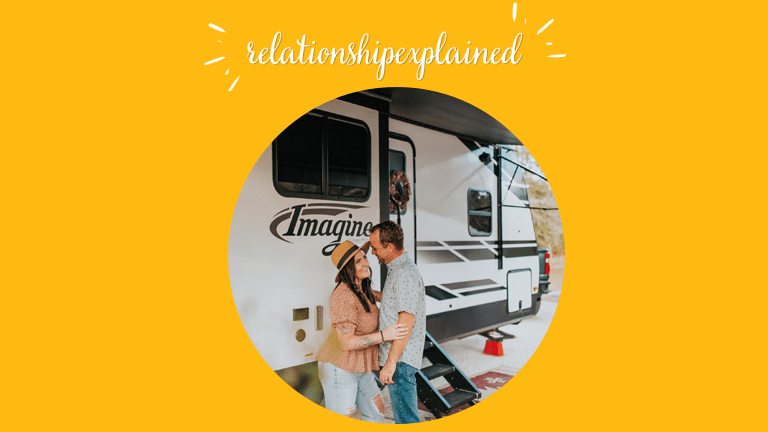Full Time RV Living Guide for Couple
Ready to trade the traditional for the transformative by embracing full-time RV living with your significant other? Embarking on this journey together can redefine your idea of adventure, community, and freedom. However, the shift from a stationary home to a nomadic lifestyle in an RV is no small feat. Well, we'll be going over: Let's […]
Ready to trade the traditional for the transformative by embracing full-time RV living with your significant other?
Embarking on this journey together can redefine your idea of adventure, community, and freedom. However, the shift from a stationary home to a nomadic lifestyle in an RV is no small feat.
Well, we'll be going over:
- How do you select the perfect RV that aligns with both your needs and desires?
- What are the essential lifestyle adjustments and preparations needed for a seamless transition to life on the road?
- How can you effectively manage your finances to sustain this adventurous lifestyle long-term?
Let's dive in.
Key Takeaways
- Choosing the right RV is crucial to your success as a full-time RV couple.
- The Full-Time RV Lifestyle can be a big adjustment, and you need to be prepared for the logistics and legalities of living on the road.
- Budgeting and Expenses are important considerations. You need to create a realistic budget that covers everything from gas and maintenance to food and entertainment.
Choosing the Right RV
When it comes to choosing the right RV for full-time living, there are a few things to consider. You want to make sure you have enough space, the right amenities, and a layout that works for you. Here are some things to keep in mind when selecting your RV.
Types of RVs
There are several types of RVs to choose from, including motorhomes, fifth wheels, travel trailers, truck campers, and campervans. Each type has its own advantages and disadvantages, so it's important to do your research and figure out which one is right for you. Motorhomes are great for those who want a lot of space and amenities, while fifth wheels are ideal for those who want a more traditional home feel. Travel trailers are perfect for those who want a lot of flexibility and the ability to easily tow their RV, while truck campers are great for those who want something smaller and more maneuverable. Lastly, campervans are great for those who want something that's easy to drive and park, but still has all the amenities they need.
Evaluating Size and Layout
Size and layout are two important factors to consider when choosing an RV. You want to make sure you have enough space to live comfortably, but you also don't want something that's too big to maneuver or park. When evaluating size, consider how many people will be living in the RV and how much storage space you'll need. When evaluating layout, think about how you'll be using the space. Do you want a separate bedroom? Do you need a large kitchen? Do you want a separate living area? These are all things to consider when selecting the right RV.
Considering Amenities
Amenities are another important factor to consider when choosing an RV. You want to make sure you have everything you need to live comfortably, including a bathroom, kitchen, and sleeping area. You may also want to consider things like a TV, refrigerator, and slide-outs. When evaluating amenities, think about what's important to you and what you can live without. Keep in mind that more amenities will likely mean a higher price tag, so it's important to find a balance between what you want and what you can afford.
Overall, choosing the right RV for full-time living is a big decision. By considering the type of RV, size and layout, and amenities, you can find the perfect RV for your needs.
The Full-Time RV Lifestyle
If you're considering transitioning to full-time RV living, it's important to understand the lifestyle you're embarking on. Full-time RVing is more than just a way to travel; it's a lifestyle that requires a certain mindset and approach to daily living. In this section, we'll cover some of the key aspects of the full-time RV lifestyle, including transitioning to RV living, maintaining relationships and community, and developing healthy habits.
Transitioning to RV Living
Transitioning to full-time RV living can be a big adjustment, but it's important to remember that it's a lifestyle choice that can be incredibly rewarding. Before you hit the road, it's important to do your research and make sure you have the right RV for your needs. Consider factors like size, amenities, and budget when choosing your RV.
Once you've chosen your RV, it's time to downsize and simplify your life. This can be a challenging process, but it's important to only bring what you need and leave the rest behind. Consider donating or selling items that won't fit in your RV or that you won't need on the road.
Maintaining Relationships and Community
Maintaining relationships and community is an important aspect of the full-time RV lifestyle. While you may be traveling on your own or with a partner, it's important to stay connected with friends and family back home. Make sure you have a reliable way to stay in touch, whether it's through phone calls, emails, or social media.
In addition to staying in touch with loved ones, it's also important to develop a sense of community on the road. Attend RV rallies and events, join online RVing groups, and get to know your fellow RVers. Having a sense of community can make the full-time RV lifestyle feel less isolating and more fulfilling.
Developing Healthy Habits
Developing healthy habits is essential to maintaining a happy and fulfilling full-time RV lifestyle. Make sure you're getting enough exercise, whether it's through hiking, biking, or other outdoor activities. Eat a healthy and balanced diet, and make sure you're drinking enough water.
In addition to physical health, it's also important to prioritize your mental and emotional well-being. Practice mindfulness and meditation, and make sure you're getting enough rest and relaxation. Finally, open communication with your partner or travel companion is key to maintaining a healthy and happy relationship on the road.
Overall, the full-time RV lifestyle can be incredibly rewarding for couples who are willing to make the transition. By understanding the lifestyle, maintaining relationships and community, and developing healthy habits, you can enjoy a fulfilling and adventurous life on the road.
Logistics and Legalities
If you're considering full-time RV living as a couple, there are several logistics and legalities to consider. Below are some important factors to keep in mind.
Choosing a Domicile State
Choosing a domicile state is an important decision when it comes to full-time RV living. Your domicile state determines your residency for tax and legal purposes. It's important to choose a domicile state that has favorable tax laws, low vehicle registration fees, and a friendly attitude towards full-time RVers. Some popular domicile states for full-time RVers include Texas, South Dakota, and Florida.
Handling Mail and Taxes
One of the challenges of full-time RV living is handling mail and taxes. You'll need a permanent mailing address for things like driver's license renewals, vehicle registrations, and tax returns. One solution is to use a mail forwarding service like Escapees or MyDakotaAddress. These services provide you with a permanent mailing address and forward your mail to wherever you are.
Securing Insurance and Roadside Assistance
Securing insurance and roadside assistance is essential for full-time RV living. You'll need insurance that covers your RV, personal belongings, and liability. It's important to shop around and compare rates from different providers to find the best coverage for your needs. Good Sam and AAA are two popular providers of roadside assistance for RVers.
In addition to insurance and roadside assistance, you may also want to consider health insurance. This can be a tricky issue for full-time RVers, as health insurance laws vary by state. You may want to consider a health sharing ministry like Liberty HealthShare or a short-term health insurance plan.
By considering these logistics and legalities, you can ensure a smooth transition to full-time RV living as a couple.
Budgeting and Expenses
Full-time RV living can be an affordable and adventurous way to explore the country, but it requires careful budgeting and expense management. In this section, we'll cover the key expenses you'll need to consider and provide tips for keeping costs under control.
Understanding the Cost of Living
Before you hit the road, it's important to understand the cost of living in your RV. You'll need to budget for food, fuel, campground fees, maintenance, and more. One of the benefits of RV living is that it can be significantly cheaper than traditional living, but expenses can still add up quickly if you're not careful.
To get a sense of your expenses, start by tracking your spending for a few months. This will help you get a realistic sense of what you're likely to spend on the road. You can also use online calculators to estimate your RV living costs based on factors like your travel style, RV type, and destination.
Managing Campground Fees
Campground fees can be a significant expense for RVers, especially if you're staying in popular national or state parks. To keep these costs under control, consider staying in less popular campgrounds or boondocking (camping for free on public lands). You can also save money by staying in campgrounds for longer periods of time, as many offer weekly or monthly rates.
Another way to save money on campground fees is to join a discount camping club, like Passport America or Good Sam Club. These clubs offer discounted rates at participating campgrounds, which can save you hundreds of dollars over the course of a year.
Controlling Travel and Maintenance Costs
Travel and maintenance costs can also add up quickly for RVers. To control these expenses, plan your routes carefully to minimize fuel costs and avoid toll roads. You can also save money on maintenance by learning to do basic repairs yourself and by keeping up with regular maintenance tasks, like oil changes and tire rotations.
When it comes to major repairs, consider purchasing an extended warranty or roadside assistance plan to protect yourself from unexpected expenses. These plans can save you thousands of dollars in the long run and provide peace of mind while you're on the road.
In summary, budgeting and expense management are critical for successful full-time RV living. By understanding your costs, managing campground fees, and controlling travel and maintenance expenses, you can enjoy the freedom and adventure of RV living without breaking the bank.
Living in an RV Full Time
If you are considering living in an RV full time, there are a few things you should know before taking the plunge. Maximizing space and storage, adapting to different seasons, and establishing routines and schedules are all important factors to consider when transitioning to full-time RV life.
Maximizing Space and Storage
One of the biggest challenges of living in an RV full time is finding ways to maximize space and storage. Downsizing your possessions is a must, but there are also many clever storage solutions you can use to make the most of your limited space. For example, using collapsible containers, hanging organizers, and under-bed storage can all help you keep your RV organized and clutter-free.
Adapting to Different Seasons
Living in an RV full time means you will be exposed to different weather conditions throughout the year. It's important to be prepared for both hot and cold temperatures, as well as rain and snow. Investing in quality insulation, heating and cooling systems, and weather-resistant gear can help you stay comfortable no matter what the weather is like outside.
Establishing Routines and Schedules
Living in an RV full time can be stressful if you don't have a routine or schedule in place. Establishing a daily routine can help you stay organized and reduce stress. This can include setting aside specific times for tasks such as cleaning, cooking, and work. It's also important to be flexible and adaptable, as unexpected changes and challenges can arise when living on the road.
Overall, living in an RV full time can be a rewarding and fulfilling experience if you are prepared for the challenges that come with it. By maximizing space and storage, adapting to different seasons, and establishing routines and schedules, you can make the most of your full-time RV life and enjoy the freedom and flexibility it offers.
Frequently Asked Questions
What are the essential considerations for a couple starting full-time RV living?
Before embarking on full-time RV living, couples should consider several essential factors. First, they need to decide on their budget, including the cost of the RV, maintenance, fuel, and campground fees. Second, they need to determine their preferred RV lifestyle, whether they prefer boondocking (camping off-grid), staying in campgrounds, or a combination of both. Third, they should research and plan their route, including the length of time they plan to stay in each location. Fourth, they need to downsize their possessions and learn to live with less. Lastly, they should consider their income sources, such as remote work, retirement savings, or part-time jobs.
How do couples manage space and privacy when living in an RV?
Living in an RV requires couples to be creative with space and privacy. Some couples opt for RVs with separate sleeping areas, while others use room dividers or curtains to create privacy. Maximizing storage space is also crucial, and couples can use under-bed storage, wall-mounted shelves, and collapsible furniture to save space. Additionally, couples can plan outdoor activities or schedule alone time to give each other space.
What is the average monthly cost for a couple living full-time in an RV?
The average monthly cost for a couple living full-time in an RV varies depending on several factors, such as the type of RV, campground fees, fuel costs, and maintenance expenses. According to one source, the average monthly cost ranges from $1,500 to $3,000, but some couples may spend more or less depending on their lifestyle and location.
What are the best types of RVs for couples to live in full-time?
The best types of RVs for couples to live in full-time depend on their lifestyle preferences and budget. Class A motorhomes offer the most space and amenities but are also the most expensive. Class B and C motorhomes are smaller and more affordable, but they offer less living space. Fifth-wheel trailers and travel trailers are also popular among couples, offering a balance between space and affordability.
How do couples handle mail and legal residency when living on the road?
Couples can handle mail and legal residency in several ways. They can use a mail forwarding service to receive mail and packages, or they can use a friend or family member's address as their legal residency. Alternatively, couples can establish residency in a state with no income tax or lower vehicle registration fees, such as South Dakota or Texas.
What strategies do couples use to maintain healthy relationships while living in close quarters?
Living in close quarters can be challenging, but couples can maintain healthy relationships by setting boundaries, communicating openly, and scheduling alone time. They can also plan date nights, outdoor activities, and hobbies together to keep their relationship strong. Additionally, couples can attend RV rallies and meetups to connect with other RVers and build a sense of community.












